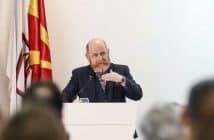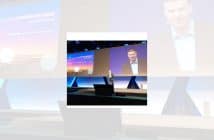The European Central Bank cut interest rates to a record low today and said it could take them lower still to prevent the euro zone’s recovery from stalling as inflation tumbles.
The move took financial markets by surprise – the euro fell sharply in response while European shares rose.
Underlining its support for the euro zone economy, the ECB also said it would prime banks with as much liquidity as required until mid-2015.
The 23-man Governing Council had faced intense pressure to act after a shock slump in euro zone inflation to 0.7 percent in October, far below the ECB target of just under 2 percent.
The ECB cut its main refinancing rate by 25 basis point to 0.25 percent. It held the deposit rate it pays on bank deposits at zero and cut its emergency borrowing rate to 0.75 percent from 1.00 percent.
Draghi stressed the ECB still had room to act if needed.
“We have a whole range of instruments to activate before reaching the lower bound … in principle we could even cut further the interest rate,” he told a news conference.
“We may experience a prolonged period of low inflation to be followed by gradual upward movements towards an inflation rate of below but close to 2 percent later on.”
The International Monetary Fund and governments from across the euro zone welcomed the move.
Italian Prime Minister Enrico Letta said the cut showed “the ECB cares about growth and competitiveness in Europe” and that it would allow a “rebalancing” of the euro-dollar rate. The finance ministers of France and Ireland echoed that sentiment.
Euro policymakers have played down the threat of Japan-style deflation, which led to a “lost decade” there, but appear to be taking no chances.
Draghi said there was general agreement on the need to act but there were differences over when to act.
A “considerable majority” on the Governing Council saw sufficient evidence for a broad-based and protracted period of low inflation, while other members had wanted to wait a month to assess incoming data.
All but one of the 23 money market traders polled by Reuters this week expected the ECB to remain on hold at Thursday’s meeting, pending a clearer view about where euro zone inflation is heading.
Draghi stressed that the ECB still had an “easing bias” to its policy stance. By contrast, many economists expect the U.S. Federal Reserve to begin withdrawing stimulus next year.
“This will give European exporters much-needed breathing space, with the euro currency finally falling back,” David Thebault, head of quantitative sales trading at Global Equities in Paris, said of the cut.
The euro slid more than 1 percent on the day to hit a seven-week low of $1.3304, down from around $1.3490 just before the ECB announcement.
Draghi reaffirmed the central bank’s forward guidance that rates would hold at “present or lower levels” for an extended period and said he saw no threat of broad deflation.
He also said banks would be able to rely on as much liquidity as they needed for longer, with the bank’s main refinancing operations to be offered at fixed rate with “full allotment” until at least July 2015.
European bank shares climbed.
Adding to the ECB’s dilemma over how to support a fragile recovery has been a fall in excess liquidity – cash beyond what lenders need to cover day-to-day operations – as banks repay 3-year ECB loans, known as LTROs, early before a health check next year.
These early repayments are expected to push interbank lending rates higher and the ECB has been considering pumping more liquidity into the system to offset this development.
Draghi said there was no meaningful discussion on Thursday about the need for a new LTRO.
“It begs the question how the ECB will react next year if growth and inflation fail to materialise,” said Andrew Bosomworth, senior portfolio manager at PIMCO in Munich.
“While quantitative easing would be the next logical step, I think the politics of asset purchases and the bifurcation within the euro zone mean the deflationary threshold for QE will be much higher than in other countries conducting this experiment.” Source: Reuters



